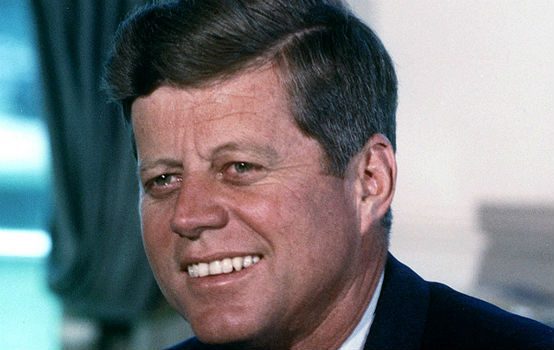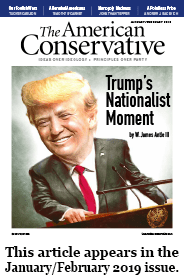How the Medal of Freedom Became a Fraud

As headlines go, the one appearing in The New York Times on November 16, 2018 does not qualify as a showstopper. “Trump Awards Medals of Freedom to Elvis, Babe Ruth and Miriam Adelson,” the Times reported. Most readers taking note of this ceremony, which presidents have been hosting annually for over a half-century now, probably shrugged and poured themselves another cup of coffee. Yet here, in this accolade conferred on the King, the Bambino, and the wife of a casino mogul, we get a glimpse of how far down the road to perdition our beloved country has traveled.
For a century and a half after declaring its independence, the United States managed to survive—nicely, in fact—without any such means of conferring presidential favor. Only in the 1960s did John F. Kennedy discover this void in American civic life and set out to fill it. His decision to do so cannot be understood except in the context of the then-ongoing and frosty Cold War.
Kennedy’s predecessor, Dwight D. Eisenhower, had made much ado about America’s close association with the divine, inserting “under God” into the Pledge of Allegiance and signing legislation making “In God We Trust” the national motto. Here, according to Ike, was the essence of what distinguished us from our adversaries. We believed; they did not.
Under Kennedy, God suffered a demotion of sorts, supplanted by freedom in the hierarchy of objects deemed worthy of worship. In his famous inaugural address, Kennedy not only anointed freedom as the supreme value but also declared that it was in imminent peril. Simultaneously celebrating freedom—implicitly defined as opposing communism—while warning of its impending demise emerged as an abiding theme of JFK’s abbreviated and largely undistinguished presidency.
Considered in that context, the Medal of Freedom forms part of a larger effort to package in a single word America’s mission, history’s purpose, and the aspirations of all humanity, with Kennedy himself their foremost champion. According to the directive establishing the award, its aim was to honor individuals making an especially meritorious contribution to (1) the security or national interests of the United States, or (2) world peace, or (3) cultural or other significant public or private endeavors.
The criteria are worth noting. The first and second qualify as straightforward and unobjectionable, if perhaps not mutually consistent. The third criterion, by comparison, is broad and vague—sufficiently elastic to include just about anyone doing anything that happens to catch a president’s fancy.
Almost from the outset, recipients of the Medal of Freedom have tended to fall into one of three categories. In the first are individuals who testify to the incumbent president’s preferred self-image. For Kennedy that meant sophistication and class. So the first tranche of those selected to receive the Medal of Freedom featured such notables as singer Marian Anderson, cellist Pablo Casals, photographer Edward Steichen, and literary critic Edmund Wilson.
The second category is all about virtue signaling, as exemplified by Richard Nixon’s choices of labor leader David Dubinsky and composer Duke Ellington to receive the Medal of Freedom. Evidence suggesting that Nixon was particularly fond of left-leaning labor organizers or African Americans is sparse. Yet by honoring Dubinsky and Ellington, Nixon could strike an appearance of being broad-minded, tolerant, and even hip, at virtually no cost to himself.
In the third category are individuals chosen to make a political statement, more often than not catering to a particular constituency. Ronald Reagan’s selection of Louis L’Amour, author of potboiler cowboy novels, pleased his Western fan base. Similarly, his choices of Milton Friedman, Clare Boothe Luce, and Albert Wohlstetter found favor with free marketeers, devout anti-communists, and neoconservatives, respectively.
Little of this mattered. The Medal of Freedom’s substantive impact was on a par with the presidential pardon granted to a couple of lucky turkeys just prior to Thanksgiving each year. It amounted to little more than a photo-op. In the larger scheme of things, the Medal of Freedom did nothing to hasten the downfall of the Evil Empire. The best we can say is that it did not retard the eventual outcome of the long twilight struggle.
With the end of the Cold War, however, and especially after 9/11, the Medal of Freedom went from being irrelevant to somewhere between whimsical and fraudulent. Any correlation with freedom as such, never more than tenuous in the first place, dissolved altogether. For evidence, we need look no further than the current crop of awardees.
That the Sultan of Swat and Elvis each left an indelible mark on American life is no doubt the case. Yet Babe Ruth died in 1948 while Presley “left the building” in 1977. Awarding them the Medal of Freedom at this point adds nothing to their stature and smacks of presumption, more or less akin to the Congress promoting George Washington to the rank of General of the Armies back in 1976. Besides, if Ruth, why not Lou Gehrig? Why not the entire 1927 Yankees starting lineup? If Presley, why not Buddy Holly, Ritchie Valens, and the Big Bopper? Why not every member of the Rock & Roll Hall of Fame?
As for Ms. Adelson, while her philanthropic activities are admirable, they fall well short of being unique. In fact, her selection to receive this presidential bauble stems less from Adelson’s charitable giving than from her marriage to a billionaire who donated $25 million to Donald Trump’s 2016 presidential campaign while kicking in another $113 million to support the Republican Party two years later. The Adelson Medal of Freedom was bought and paid for many times over.
I do not mean to imply that Trump deserves principal blame for trivializing and degrading the Medal of Freedom. On that score, primary credit goes to George W. Bush, who conferred this ostensibly great distinction on three individuals who figured prominently in engineering the debacle of the Iraq war: former CIA director George “Slam Dunk” Tenet, General Tommy Franks, and failed American viceroy L. Paul Bremer. Passing out laurels to mediocrities who screw up: for evidence of the sense of entitlement that has come to pervade the American establishment, one need look no further.
President Barack Obama’s contribution to the Medal of Freedom’s decline in status was of a different order: he gave out medals like pieces of Halloween candy, his 123 being the most ever awarded by any president. As any list of honorees becomes longer, it necessarily becomes less selective. So Ellen DeGeneres got one from Obama, as did Ernie Banks, Michael Jordan, and basketball coach Dean Smith. All estimable individuals no doubt, but arguably not what JFK had in mind when he instituted the Medal of Freedom in the first place.
Whatever modest value JFK’s initiative may once have possessed has long since dissipated. In the present moment, with Americans disagreeing vehemently as to what freedom requires, permits, or prohibits, it just might be time to give the Medal of Freedom a rest. Let’s figure out what freedom means. Then it may once more become appropriate to honor those who exemplify it.
Andrew J. Bacevich is TAC’s writer at large. His new book Twilight of the American Century has just been published.
Comments